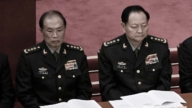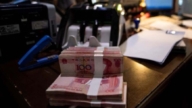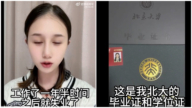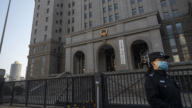【新唐人2012年3月6日讯】2月28号,世界银行行长佐利克在北京举行记者会,遭遇现场抗议。一名自称杜建国的人闯入记者会现场,散发材料,斥责世行不应该鼓吹中国企业私有化。有学者指出,国有企业的垄断导致中国老百姓大面积贫穷,杜建国的言论并不代表民间声音,反而是官方扭曲的价值观。大陆人士指出,杜建国属于极左派团体《乌有之乡》网站成员,党内一些保守的元老支持他们。而佐利克在事后表示,中国的改革正在触动很多既得利益者的利益,包括一些垄断企业。
2月27号,世行发布报告,建议中国继续推进市场化改革,28号,世行行长佐利克的记者会上,杜建国出现会场演讲,抗议国有企业私有化,并散发宣传材料。佐利克在工作人员把杜建国拉走之后,为报告辩护,他说,中国的改革正在触动很多既得利益者的利益,包括一些垄断企业。
北京注册会计师杜延林披露,杜建国是属于《乌有之乡》网站,极左派团体。
杜延林:“我知道《乌有之乡》这些人其实他是有组织的,他不是个人的。我知道像张洪量啊,像杜建国这些所谓的学者,其实我听过他们的演讲,他们有经费来源。也就是党内一些极端保守的元老支持他们。”
杜建国在散发的材料上,首先反对银行私有化,他指责美国私有银行将美国以至于全世界拖入危机泥潭。杜延林指出,所有前社会主义国家的改革方向都是私有制,因为这是经济规律决定的。
杜延林:“市场经济下的经济行为,在亚当斯密的著作中写的很清楚,是要通过看不见的手,通过每一个个体,每一个市场经济参与者的追求私利,来达到一种平衡,一种效率。”
杜建国材料上的第二个观点是反对“国有企业”私有化,他认为,“私有化”把原本属于全体人民的财产据为己有。
杜延林反驳说,中国的国有企业并非属于全民,而是属于既得利益集团。国有企业的壮大是以牺牲了多数人的利益为代价的。
杜延林:“而真正私有化以后量化到每个人头上,每个人都成为股东才能够获益。恰恰是因为国有企业享受了太多的特权,享受了太多的优惠,垄断了资源,才有所谓的壮大。现在国有化就是既得利益集团,几个家族在垄断、在控制着国有企业。实际上国有企业是独裁者进行统治的一种工具。”
经济学者巩胜利指出,中国老百姓的大面积贫穷,与国有企业大面积的垄断是密不可分的。
巩胜利:“像中国移动,它的市场就占了全中国移动市场的超过百分之八十。还有中国的国有银行,四大家族,就是工中农建,他的市场量超过百分之八十,你想这样的市场拥有量。有数据证明,中国的银行业比美国的银行业高出百分之四点七倍,你想想看,这么大的利润,这么大数据的支撑,在中国很多人却视而不见。”
经济学家茅于轼认为“公有制让百姓饿肚子”。他向媒体表示,国企做得好是个别,做不好是普遍,而且他说,中国非常严重的特权问题也和“公有制”有关系,“要消灭特权,也必须得实行私有制”。
新唐人记者秦雪、柏妮采访报导。
CCP Supported Disruption to World Bank News Conference.
On February 28th, World Bank President Robert Zoellick
held a press conference in Beijing, but encountered a protest.
A man who named himself Du Jianguo broke into the
conference and distributed materials.
He denounced the World Bank, and that it should not be
advocating the privatization of Chinese enterprises.
Some scholars pointed out the monopoly of state-owned
enterprises led to the poverty of a large number of Chinese.
The voice of Du Jianguo can’t represent the Chinese,
but only the distorted value of the authorities.
Many Chinese pointed out, Du Jianguo is
a member of the extreme left-wing’s website “Utopia”.
This got the support from many conservative
senior statesmen of the Chinese Communist Party (CCP).
After the event, Zoellick said the reform in China
touched the benefit of vested interests, including monopolies.
On February 27, the World Bank released a report,
recommending China to continue market-oriented reform.
On February 28, the World Bank President Robert Zoellick
held a press conference.
Du Jianguo began to protest the privatization of state-owned
enterprises, and distributed related materials.
After Du was kicked out of the conference,
Zoellick defended the report.
He said China’s reform touched the benefit of the vested
interests, which including some monopolies.
Du Yanlin, a Beijing certified accountant, revealed
Du Jianguo is working for the website “Utopia”. This is a website of an extreme left-wing group.
Du Yanlin: “I know the website ‘Utopia’ has an organization.
It’s not an individual one. I know those so-called scholars
which like Zhang Hongliang and Du Jianguo. In fact, I listened to their speech.
They have economic support, they are funded by the extreme
conservative senior statesmen from CCP.”
The first topic of the material that Du Jianguo spread
is against the privatization of the banks.
He accused U.S. private banks bringing the U.S. economy,
even the global economy into crisis.
But Du Yanlin pointed out that all former socialist countries
are in reforms that directed to privatization. It was decided by the laws of economy.
Du Yanlin:"The economic behavior of the market economy,
which is described very clearly in the books of Adam Smith,
is that every individual, every participant of the economy
pursue their interests.
It then reaches a balance and a kind of efficiency
by an invisible hand.”
The second topic of Du Jianguo’s material was against
the privatization of the state-owned enterprises.
He believes privatization will allow a group of people to
occupy public properties, which should belong to everyone.
Du Yanlin stands against his words. Chinese state-owned enterprises don’t belong to all Chinese,
but to a group with vested interests.
The growth of state-owned enterprises are based on
the sacrificing of most people’s benefits.
Du Yanlin: “Only after a real privatization will everybody
share a part, will be a stakeholder share the benefit.
Currently in China, state-owned enterprises have so many
privileges, and enjoy so many benefits. They monopolies the resources.
It’s the vested interests of few families monopoly
controlling state-owned enterprises.
Actually, state-owned enterprises are a tool
that the dictatorship uses to control the country.”
Gong Shengli, an economist pointed out that the reason
why Chinese are in large scale poverty is inseparable with the large-scale monopoly of state-owned enterprises.
Gong Shengli: “Like China Mobile, who shares over 80%
of the market in China.
The state-owned banks which are the four big families:
Industry and Commercial Bank of China (ICBC),
Bank of China (BC), Agriculture Bank of China(ABC)
and Construction Bank of China(CBC).
They share more than 80% of the market.
Look at this market and the share.
There’s data that shows China’s banking sector is
4.7 times that of the U.S. banking industry.
Please think of it. There’s so much data proving huge bank profits,
but most Chinese aren’t aware of this.
Mao Yushi, an economist thought “the public ownership
makes the people hungry.”
He told media thatonly a few state-owned enterprises
are doing well, but in general they didn’t do well.
He said the serious privilege issues in China are connected
to the “public ownership”.
“To eliminate the privilege, it must implement
private ownership.”
NTD reporters Qin Xue and Bo Ni






























